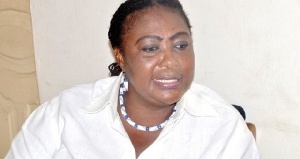Ms Tina Mensah, the Deputy Minister of Health, has commended the Glaucoma Patients Association of Ghana (GPAG) and its partners for their sustained efforts at increasing hospital attendance for voluntary eye testing.
She also thanked the Ophthalmological Society of Ghana (OSG), the National Eye Care Secretariat, Optometrist Association of Ghana, Ghana Ophthalmic Nurses Group and all other stakeholders for their support and persistence in awareness creation.
She urged them not to relent on their efforts but to continue to press on to achieve the Sustainable Development Goals and reduce glaucoma in Ghana.
Ms Mensah gave the commendation when she launched the 2020 World Glaucoma Week in Accra on Wednesday, on the theme: “Green=Glaucoma…Go get your eyes tested for Glaucoma. Save your Sight”.
She said the global week celebration was to alert people to have regular eye checks for early detection and treatment of glaucoma, while increasing awareness and accessibility to knowledge on eye-care, with the ultimate goal to preserving sight globally.
She explained that Glaucoma was a group of diseases that caused gradual damage to the optic nerve tissue due to high build-up of fluid pressure in the eye, and may result in irreversible blindness if not detected early and treated.
It is nicknamed; “Silent blinding disease or sneak thief of sight”, because there was usually no symptoms or pain associated with the onset of the disease and the loss of vision normally occurred gradually over long period of time when the disease is advanced, she said.
Ms Mensah said the disease was the second most common cause of blindness globally, but though the 700,000 Ghanaians living with Glaucoma had not drastically reduced, the current situation was encouraging because more people were now going for voluntary regular testing.
Lack of education on the diseases in some parts of the country had resulted in stigmatisation and neglect of some affected persons, with the inadequate number of Ophthalmologists making it difficult for early detection, diagnoses and access to surgical care to restore sight.
Ms Mensah said the Ministry of Health was also committed to investing in health and social systems vital to improving care and services for patients.
Dr Boateng Wiafe, an Ophthalmologist Operation Specialist, mentioned some known risk factors of glaucoma as intraocular pressure (IOP) meaning high pressure in the eye causing damage to the optic nerve; age, race, myopia (short sightedness), as well as family history.
He said current statistics showed that 78 million had glaucoma globally, and an estimated 111.8 million were predicted to be affected by 2040, but only half of the affected persons were aware of their condition, while only 10 per cent awareness level existed in the low and middle income countries including Ghana.
Again, one in 200 people aged 40 have glaucoma, which increased to one in eight by age 80, with the most vulnerable being the elderly, women, ethnic minority, and persons with family of glaucoma.
Dr Wiafe also spoke about the unfair distribution globally saying an estimated one billion people lacked access to eye-care services.
He, however, attributed the high-rate of blindness caused by glaucoma largely to subjective factors including non-compliance to medication schedules, late presentation, lack of knowledge and high severity at time of diagnosis.
“The earlier the diagnosis, the less damage would be done and the more vision will be saved,” he said.
Mr Harrison Kofi Abutiate, the President of the Glaucoma Patients Association of Ghana, said the week would be marked with activities including radio and television shows and a free eye screening on Saturday at the Osu Ebenezer Presbyterian Church Hall.
He urged the public to take advantage of the facilities available in some eye-care facilities in the country to know their statuses and to seek for immediate treatment if diagnosed with glaucoma.
He also called for sustained budgetary allocation by the MOH as well as financial institutions and individuals to support the awareness creation.
Health News of Thursday, 12 March 2020
Source: GNA
World Glaucoma Week launched in Accra
Entertainment
















